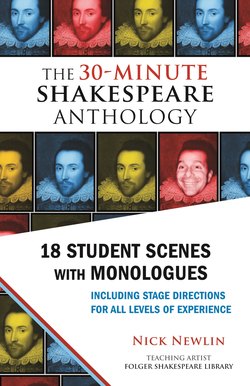Читать книгу The 30-Minute Shakespeare Anthology - William Shakespeare - Страница 23
На сайте Литреса книга снята с продажи.
ОглавлениеHENRY IV, PART 1: MONOLOGUE NOTES
ACT III, SCENE II: PRINCE HAL MONOLOGUE
The first three words in this monologue—“I will redeem”—set the tone for what is to follow: Prince Hal’s promise to turn his shame into glory at Hotspur’s expense. It is important to know how Hal has behaved up until this point: wasting his time in the company of drunkards. However, there have been hints that this was not the “real” Prince Hal or at least not his sum total.
When performing a monologue, it is essential to know where the character has been and what has brought him to this point. The monologue might stand alone when you perform it, but to give the piece justice, you must familiarize yourself with the character within the context of the entire play.
In Act I, Scene II, Prince Hal expounds, “I’ll so offend to make offense a skill/Redeeming time when men think least I will.” Likewise, in Act II, Scene IV, when Falstaff and Hal have been role-playing and Hal play-acts the role of his father, King Henry, Falstaff proclaims, “Banish plump Jack, and banish all the world.” Prince Hal then responds prophetically, “I do. I will.” Hal’s monologue represents the turning point that Shakespeare has hinted at; Prince Hal is going to seize his birthright and his destiny and redeem his past shames.
Hal must convince his father, King Henry, that he can and will change. Remember that this is both a private talk between a father and son and one between a ruler and his heir. To make his case, Hal uses strong words that require emphasis and color. Prince Hal’s bad reputation is represented by words like “stain,” “scour,” and “shame.” These stand in contrast to the words he uses to describe his future: “glorious,” “bold,” “honor,” and “renown.”
How do Prince Hal’s face, body, and voice express these contrasting images? Perhaps he looks down when discussing his shame. When he speaks of what will happen when he meets Percy, known as Hotspur, he might look his father directly in the eye and shows his true confidence and fire. Between Hal’s past and future is the day of redemption: “And that shall be the day, whene’er it lights.” Hal can imagine that day and picture the sun rising. How does a sunrise look and feel when it is a day you have been waiting for your whole life? Show this in your eyes, and let it ring in your voice.
Hal contrasts Percy’s honor with his own shame. In the notes included with the Folger edition of the text, the phrase “every honor sitting on his helm” is explained as “Hal imagines them as insignia worn on Hotspur’s helmet and contrasts them with the shames worn on his own.” This reminds me of when I first played tackle football in the seventh grade; our coach, who was a cool high school football player, would put gold stars on our helmets for outstanding play. I remember how it felt to get a gold star.
If you can find a personal connection to the images painted by your character’s words, you will be able to personalize your monologue and bring your own life experience into it. As mentioned in the performing notes, when we performed the scene with a group of high school students, the young actor playing Hal had just narrowly escaped being expelled from school and had likely had an emotional exchange with his father similar to the one between Prince Hal and King Henry. We have all had parents and thus have personal experiences we can bring to this scene.
Study the text carefully to glean clues on how to play the speech. It is important to note that Hal uses words with typically positive connotations to describe his enemy, Hotspur: “honor,” “renown,” “gallant,” and “all-praised.” Hal could spit the words out with contempt or draw them out exaggeratedly. He might choke up on one of the words. King Henry has not only compared his son Hal unfavorably to Hotspur, but he has also insinuated that Hal might actually join Hotspur in a fight against the King “to show how much thou art degenerate.” Would this not hurt a son’s feelings? Experiment by performing some of Hal’s lines with emotions such as contrite, hurt, angry, or bold.
The hurt might turn to anger and willfulness as Hal predicts that he will exchange Hotspur’s “glorious deeds” for his “indignities.” Thus the monologue can have several phases, moving from contrition through anger, boldness, and finally to the promise of loyalty. Hal’s words and phrases in the final lines of the speech portray assurance—“This in the name of God I promise here . . . I do beseech your Majesty”—and end with the strong pledge, “And I will die a hundred thousand deaths/Ere break the smallest parcel of this vow.”
These are the words of a Prince Hal quite changed from the carousing Hal of the tavern. They are the oaths of a prince ready to redeem his past transgressions and willing to die for King and country. Portray Hal’s dramatic personal transformation in your performance of Shakespeare’s moving words.
SUGGESTED VIEWING
THE HOLLOW CROWN
Season 1, Episode 2, 2012
Director: Richard Eyre
Starring: Jeremy Irons, Tom Hiddleston
HENRY IV, PART 1
Royal Shakespeare Company, 2014
Director: Gregory Doran
Starring: Jasper Britton, Alex Hassell
